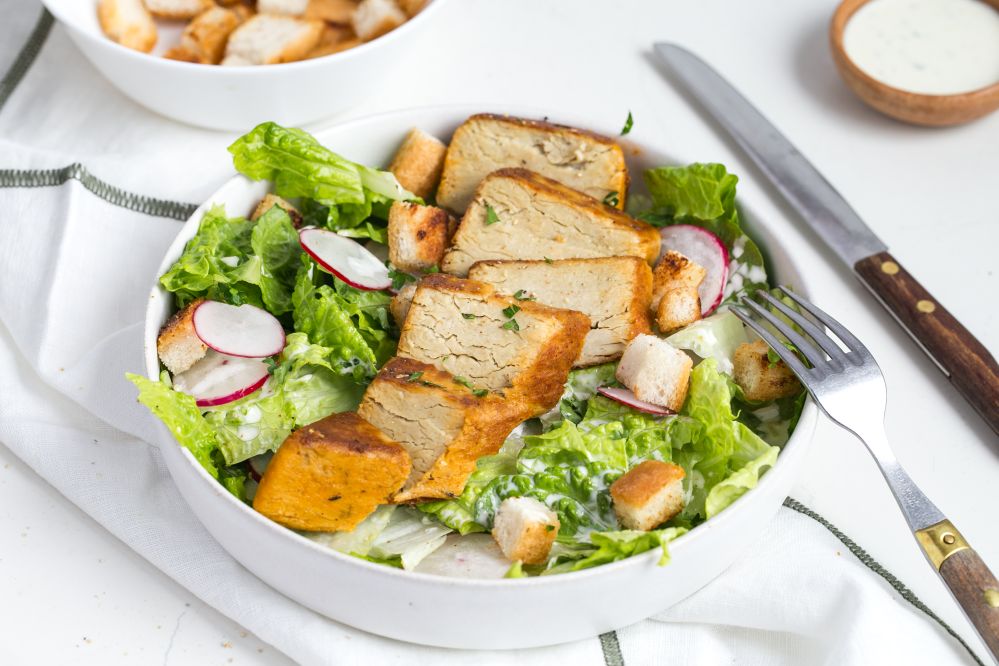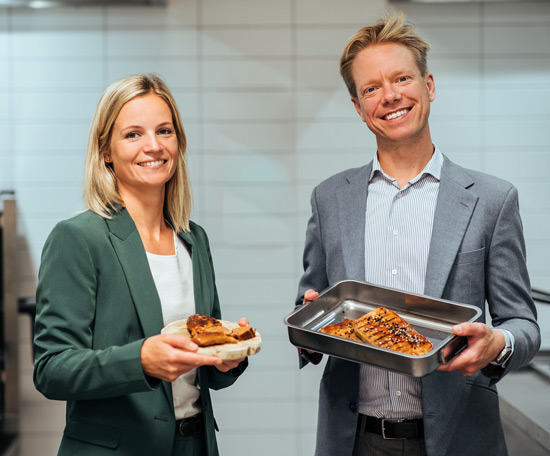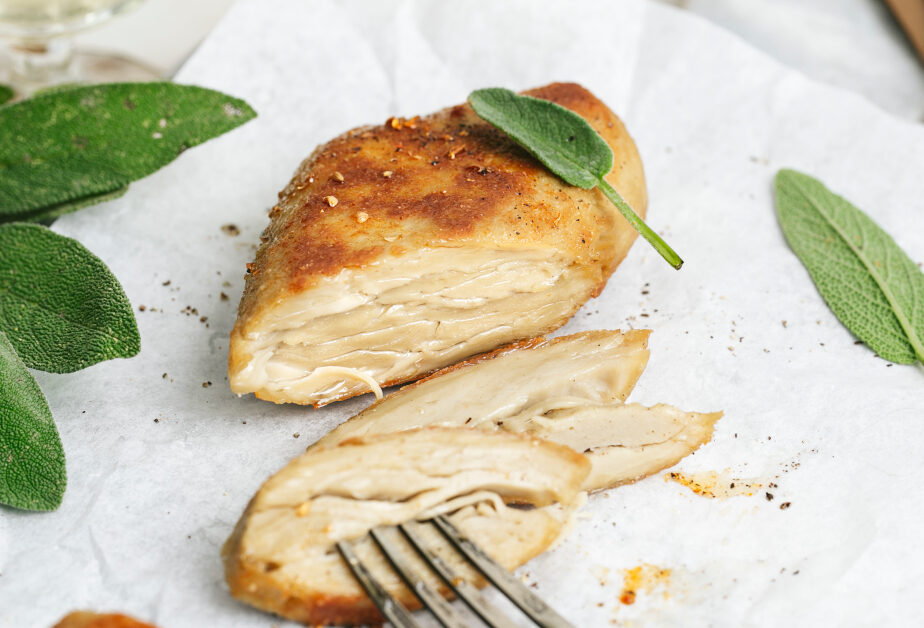Dutch startup Rival Foods will start deploying shear cell technology—a novel approach to texturizing plant-based proteins that can create whole cuts—at a “commercially viable scale” this summer.
A spinoff from Wageningen University founded by Dr. Birgit Dekkers and Ernst Breel in 2019, Rival Foods is currently supplying chicken fillets, chicken chunks for skewers, and pulled chicken to select restaurants in The Netherlands and Germany.
With equipment that should be up and running at a new facility in July, Rival Foods will be able to make up to 400 tons a year as it scales up to supply foodservice customers in the UK and France, followed by a move into retail markets in 2025. The ultimate aim, says Dekkers, is to get to a throughput of 1,000 kilos an hour.
Heat + pressure
While shear cell tech also deploys heat and pressure to make plant proteins behave more like animal proteins, it typically requires less energy than high-moisture extrusion cooking processes (where molten materials are forced through an opening and then cooled) and can offer more precise control over the texture of the final product, claims Dekkers. “Whereas extrusion is kind of a black box.”
Shear cell tech—which she describes as “like a pressure cooker with rotating parts”— can “recreate that really fibrous texture of meat protein, but can also create a flaky fish texture, if you vary the ingredients and processing conditions,” says Dekkers.
It also enables the production of larger ‘whole cuts’ of plant-based meat, without having to use binders to glue smaller pieces of plant-based meat together, says Dekkers, who believes whole cuts will eventually comprise up to 50% of the category.
“One of the biggest obstacles to the success of plant-based whole cuts is achieving the right texture,” claims Martina Pace, supervisory board member at Rival Foods and COO at VC firm PeakBridge, which led a €6 million ($6.5 million) series A round at Rival Foods in the fall of 2022 also backed by Roquette Ventures.
“With its best-in-market texturizing technology, Rival Foods is positioned to make significant impact at the center of the plate. Plus, this same technology can texturize a range of proteins, which opens up vast possibilities for the future.”

Patent protection
The basics of shear cell technology, which is ideal for lean whole cuts containing up to 10% fat, according to Dekkers, “have been described in the scientific literature.” But this doesn’t mean anyone can deploy it at scale, she says.
“There are three patents for scaling this technology, two of which are owned by us,” says Dekkers. The third patent, which emerged from Plant Meat Matters, a partnership between Wageningen University and firms including Givaudan, Ingredion and plant-based meat brand The Vegetarian Butcher (now owned by Unilever), is owned by Wageningen, and has been licensed to Rival Foods, she says.
“The patent that came out of this consortium, we have the exclusive license on that until the end of 2027.”
She adds: “So for example, The Vegetarian Butcher is interested in the products we’re creating, and if we show them that we can produce them at scale at a cost competitive price, they could become a customer.”

‘We are really focused on the b2b approach’
Rival Foods is one of several players making ‘whole cut’ meat alternatives, from Switzerland-based Planted to Slovenia-based Juicy Marbles [disclosure: AgFunderNews’ parent co AgFunder is an investor]; Netherlands-based Redefine Meat; Israel-based Chunk Foods; Indonesia-based Green Rebel Foods; Germany-based Project Eaden; US-based MyForest Foods, Meati Foods, and Mooii Meats; France-based Umiami; and Spain-based Novameat.
Unlike most of the players above, Rival Foods is not looking to build a consumer brand, however, says Dekkers.
“We are really focused on the b2b approach. So we’re initially selling to restaurants and catering companies, and then through retail, both via retailers’ private label, but also via white label to branded food companies that then sell to retail.”
Should things take off, Rival Foods could in future supply its tech to other manufacturers under license such that they could produce products using shear cell directly, says Dekkers. “At some point, we see ourselves as an enabling company. But we first have to show what our products can do and whether they really change the behavior of consumers.”
Asked how shear cell compared to some other approaches to making whole cuts, from 3D printing to fermentation, electro-spinning and ohmic heating, she said: “All these technologies have their pros and cons. For example with 3D printing, you have to print line by line, so scalability can be a challenge.”
But there is room for lots of different approaches, she says, as “right now, while shelves are packed with products in the unhealthy processed category (burgers, sausages, nuggets, etc) there are currently almost no whole cut plant-based products on the shelves.”
While retail sales of plant-based meat have been falling in the US, “In Europe, it’s more a case that growth is stagnating rather than declining,” says Dekkers. “Retailers and governments also understand that we cannot continue consuming as much [animal-based] meat. But quality, taste, mouthfeel and texture is key to convince more consumers to choose these types of products.
“And that’s where we feel we have made a major step. In consumer testing, we score better than comparable plant-based products, and on price, we are obviously more expensive than the cheapest chicken, but not as expensive as some premium organic products.”
Further reading:
Swiss startup Planted rolls out ‘first of its kind’ fermented plant-based steak





